Theo Verelst Local Diary Page 23
The same holds as for my tripod and
other diary pages: nothing on this page may be copied or changed and
distributed except that the page as a whole may be printed or otherwise
transfered in unchanged form, mentioning the original URL
and global page reference, and that holds for everyone on the globe
and beyond, including so called 'christians' and self-appointed 'Secret
Services'.
Home (alt) Tripod Home Local Diary list (Secure) Tripod Diary
List Previous Diary
Sun Mar 20 23:37 2005
How is it with all these wild ideas about synthesizers I had years ago?
Only way out-of-line dreams of a lunatic with delusions of grandure who
seeks out of proportion attention and grandure measures?
No, in fact I've found opportunity to make some progress in the area,
which is ongoing at the moment, to prepare another working prototype of
a digital synthesizer in 19" rack form, based on the Analog Devices
blackfin DSP, with additional hardware.
The main logical circuit addition is a Xilinx coolrunnerII board which
is use to interface with the DSP external bus and which can drive
displays and read switch information and which I've burned a MIDI IN
interface into which can be read by the DSP.
I'll update some page or pages with this stuff, the idea is that it
will be open source mainly for non-commercial use.
The enclosure has been updated a few times, it contains a number of
rotary knobs as yet unassigned except for a clicking counting knob
which is read by the Xilinx, two push buttons for data entry and I've
put in the LCD display in the opening in the front pannel. Also the
back has been updated with a (5 pin DIN) midi socket.
The first tests I've done with a cheap midi keyboard (5 octaves, touch
sensitive) which drives the MIDI-IN input and after the midi circuit
(with the obligatory opto-coupler, see midi association) had been
somewhat tested and found working I made the first sine wave sample
repreoduction program for the blackfin to work with it, so monophonic
sine wave lines can be played on the keyboard, where the sound neatly
comes out the backside jack output.
Now I'm in the process of soldering in some circuits I had put on
breadboard, wiring the MIDI-IN connector (it also can give supply to
the keyboard) and writing some more synthesis programs for the DSP,
assuming all continues to work well.
The machine currently looks like this:
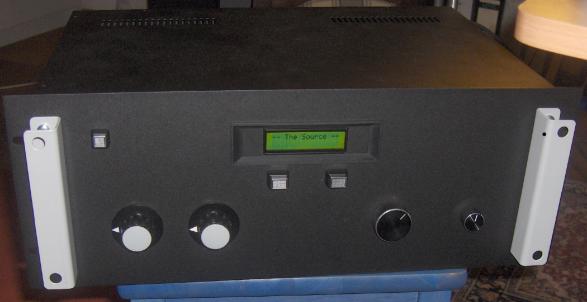
Christians ?
As I was tought long ago, I think it is indeed: people can't make or
unmake themselves 'real' christians because the essence of that sort of
life is not originating from choice. Not that people can't chose
to go to church or lets say like Jesus or something of the kind, it is
about the essential change in a human life which has in that respect to
originate from God, and not from human works or action.
I'm sure that that is important as counter doctrine to a lot of
catholic thinking and other cults think along simalar errors, that they
themselves or some organisation or secret club can accevt the election
and calling which is originally from God, as I indeed believe it is.
So the 'real' christians haven't been made by anything human or humanly
influencable, to begin with, that game of picking the puppets or
motherf* -ing life together is not from the real God and not capable of
changing His plans and his characters.
April 19 2005
The above was a starting page which I hadn't finished, so meanwhile
I've made the whole synthesizer work, and even demonstrated it in the
midi studio of Delft University of Technologies Cultural Centre, see this page about the synthesizer:
So the machine really works and makes really great sounds as it is
already, very strong and warm and clean sounding see the page for sound
examples in mpeg4 and wav format.
I've made a new page on Rock and
Roll music, which interests me, and which I might extend with some
recordings of my own, I can do some Fats and Chuch myself, which is of
course easier, 50 years later! Also check out this page on work I did
while in france last year, with a additive synthesis sound generator
with socket connecton and interactive text interface to the sound
engine, and a bwise graph to see the signal form from the sample
processor.
Mathematics, are they programs?
No, I would not think that the whole beast of software thinking has
actually made to 'rule' the history of or contemporary
mathematics.Mathematics can be seen as a sort of recepy in the form of
a sort of program in various cases, but the building of mathematics is
not of a program nature, it is rather a foundation for understanding
the physical sciences, and all kinds of abstract prblems than a program
or set of programs, which is quite different, no matter what people
might think.
I've been into theoretical (nuclear) physics at lets say at least the
level of a PhD student in Delft university while I was still working
there.and that's about as tough as mathematics can get for anyone in
any existing field of mathematics and science in general, so I can say
with significant authority that those mathematics are NOT a program, or
implementing some program in the sense of comparable with computer
programs, really people comparing that don't know what the hell they
are talking about.
Those are very complicated buildings of the nature of higher
mathematics, integral calculus, multdimensional analysis and such,
which have absolutely nothing to do with programmers mind sets, nothing
at all.
Out of theoretical interest, and with an interest in various practical
applications, such as sampling theory and sound synthesis and other
electrical engineering disciplines, I've looked into the mathematical
package Maxima, which is a
sort of free Mathematica, in open source form, and coming from one of
the first computer algebra progams, written long ago (before maple and
matlab) at MIT, in the LISP programming language.
The package can be downloaded with a tcl/tk based frontend/user
interface
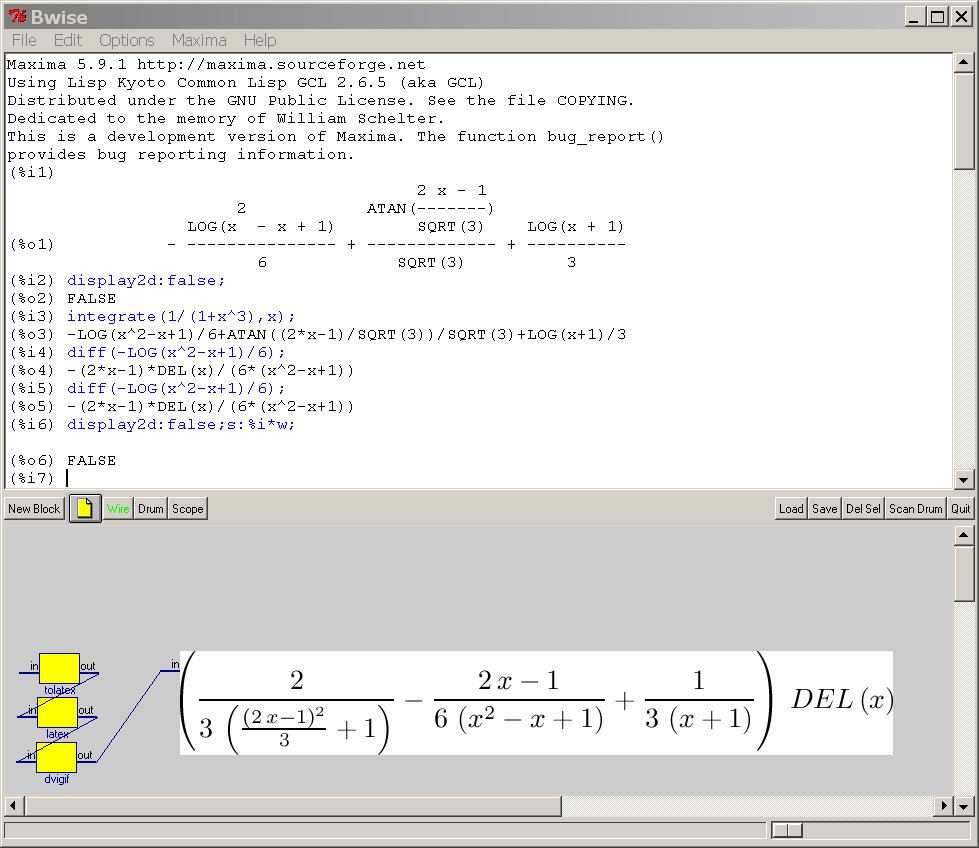
Example of the Maxima package running
some computations with the addition of my BWise package
showing a neat rendering of a formula via automated latex typesetting
and conversions blocks.
As an example of what I've been looking at, lets take the first example
integral of the Maxima package for windows or linux, as it appears in
the graphical user interface example page, which is this integral:

Telling maxima to symbolically compute this integral, we get:

2 log and one arctan term, which together indeed have as a derivative
1/(1+x^3), but hard to find of course. When simply differentiating, we
get back:

and ratsimp (rational simplify) of this equation gives back the
original. The DEL(x) stands for an interpretation of dx after
differentiation.
The study of electrical engineering
When I was a post first year electrical engineering student (I
graduated, too....) it was normal in 3d year or so to start looking for
a section to do laboratory or graduation work in, which I found more or
less interesting at the time, and without knowing what all badness was
going on I was easily drawn to the most theoretically heavy and most
ambitious (and probably in certain important senses most succesfull)
and also not money poor section of the Delft University Department of
Electrical Engineering, called Network
Theory.
Currently, after I got sort of kicked out after having worked there for
4 years or sofrom when I gruduated there in about '91 the section has
merged or been consumed by 'circuits and systems', which is a disgrace
in general, probably because the dreadfullness of certain people.
However at the time I was a second or third year student, I got
interested because of this presentation in the 1986 yearbook:
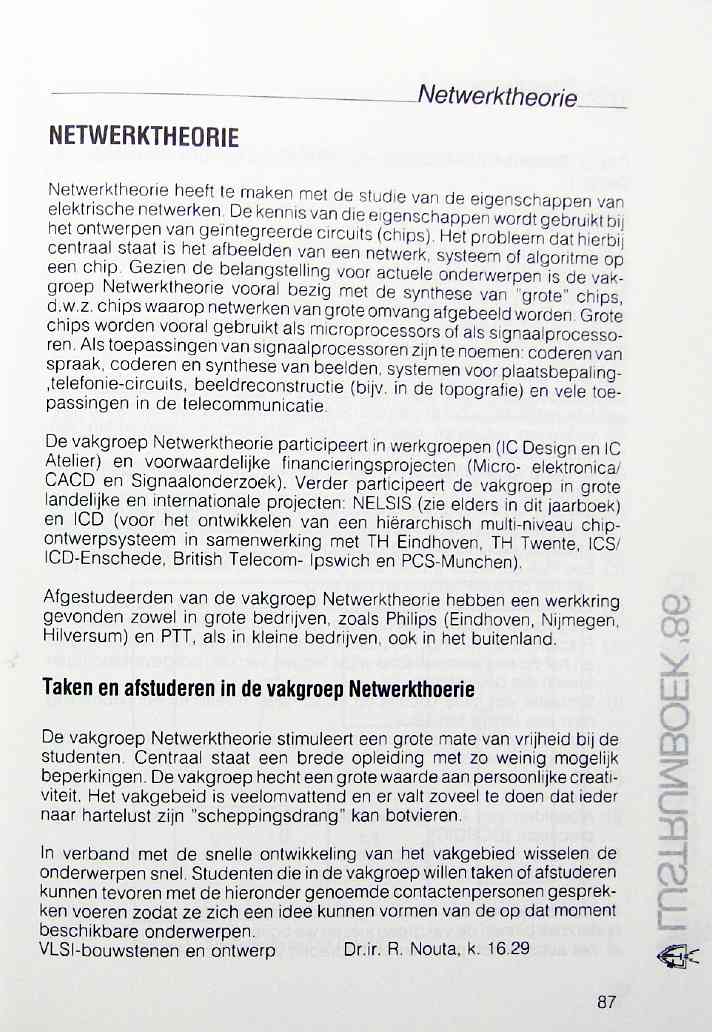
which is followed by big software and chip design examples.
At the time I had spend about a decade with TTL and other chips and
electronics, and was an electronics assistent at university, and I had
big things in my interest span, like I had teh service manual of my
DX-7 synthesizer with schematic diagram and circuit desciptions, so I
knew there were two interesting and for that time big chips in there
which gave the insturment its power, so I had serious interest in sound
algorithms and chip designs to implement them.
My digital signal processing course was a big bummer because of the
impossibly bad university teacher, the hillegiable handwritten crappy
dictation, and complete lack of content and probablu countless errors,
and I never learned much in my own interest field, probably some people
were way too affraid of the discrepancy between their talents and mine
and their engineering and scientific skills and mine to even let me
pass the exam, per definition. I was a very good student, amoung the
top 10 percent of certain years, I guess I should have passed the exam.
Well, anyhow I got sidetracked in compute graphics because of an
excellent article from to people on sabbatical in Network Theory , one
from Hewlett Packard, about ray tracing curved surfaces with a special
chip, which became the start of my masters thesis I graduated with,
though I never received *any* help on that whole thesis or any of its
content, except from reading and researching the literature list of
that article. All I ever need, but it was a crying shame, so much
ripping of of my drive and vision and charisma and so absolute nothing
in return, except after I graduated I got invited to work for the
section.
The importance of sampling theory
In my circuits and
systems course, I think in my second year, I got parallel knowledge as
from information theory and electronics courses, about one of the most
neglected subjects in signal processing of certain kinds where heavy
mathematical proofs are persued, which probably all belong straight in
the dustbin, because their mathematical proof mechanisms deny the
existence and authority of sampling theories mathematical bounderies.
With all kinds of computer and microprocessor (/controller) equipment
around, many types of analog to digital and digital to analog
conversions are part of our daily life, like CD players, computer sound
cards, digital phones and radios, etc.
Every time a signal is converted from a 'normal' analog signal to a
digital (computer or computer program) signal, or vice versa, we have
to do with sampling theory, which tells us how this conversion into
bits and bytes and samples and back to continuous electronics signals
can take place according to correct theoretical rules.
Evey contemporary CD player or computer sound card is living proof of
the fact that this rarely happens decently. Most sound quite horrible
with respect to stereo image and high frequency and impulse
reproduction. That doesn't mean a CD player necessarily has a bad
frequency range and flatness, or jitters (small relatively fast and
usually unsteady changes in frequency) or hums, but it doesn't do
justice to the way for instance fast changing high notes actually sound.
This has to do with the samplin gtheorem, or maybe better put with the
important subject of reconstruction filters,. which are in theory (and
therefore also in practice) needed to make the CD players DA converter
reproduce the originally recorded music from the CD samples.
From my second year Electrical Engineering 'Circuits and Systems'
coursebook, the relevant section (the subject also appears in
electronics and information theory):
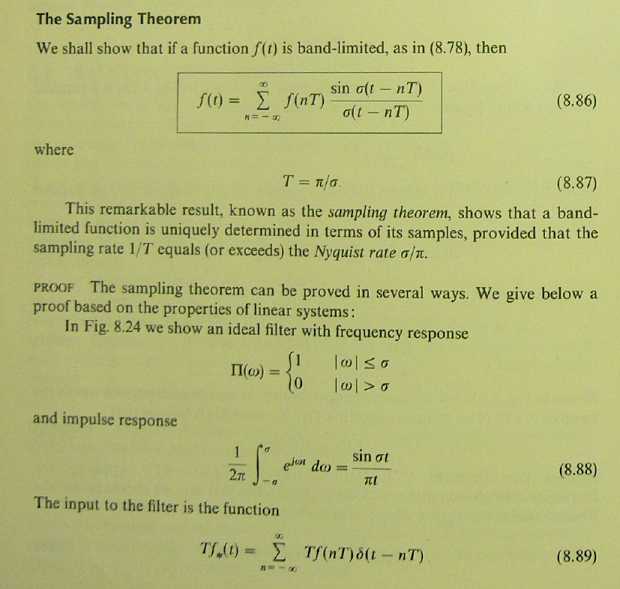
What does this say? Well we chop a signal up in pieces, and represent
these as digital samples, and then proof that those samples contain all
the information present in the original signal, under the condition
that the signal is bandwidth limited.
Also, it tells us the way to sample, and especially, the way to
reconstruct the original signal from the samples, and that that is a
complicated filter, of infinte length, which is for sake of simplicity
simply forgotton in all kinds of so called digital signal processing
proofs and algorithms. Which is theoretically wrong and also explains
the noise and practical implementation problems of many signal
processing projects.
Reconstruction filtering is an important theoretical concept which can
tech us how to perfectly find back what the master signal from a CD
looked like when it was still analog, if we are prepared and able to
follow the whole recipee, and of course compute on a infinitely long
filter....
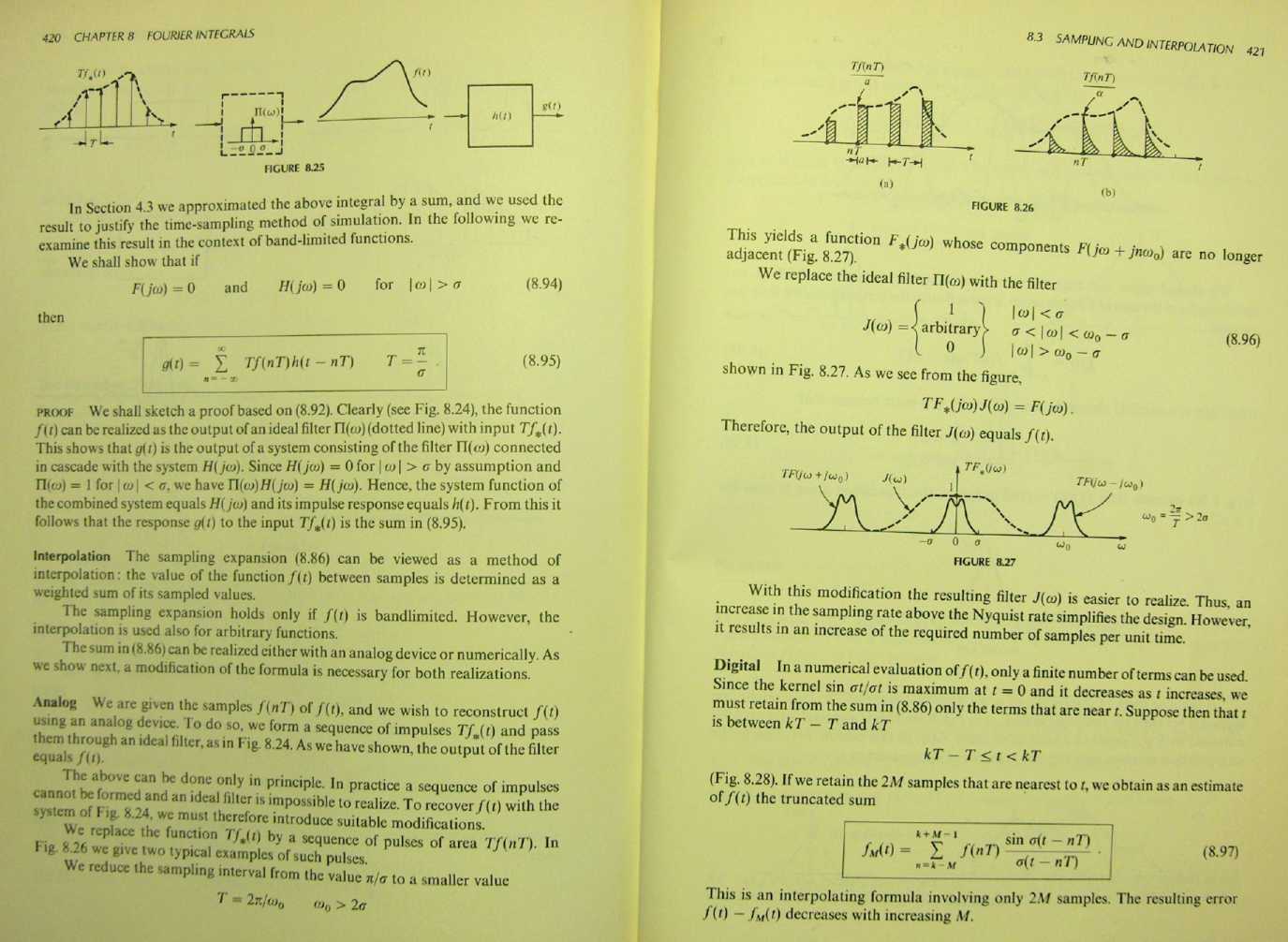
as is made clear on these pages, the original signal MUST be bandwidth
limited, or perfect reconstruction, and proofs which require this, is
not possible. A big problem for many people, and also, the perfect
orhtogonal filter or lets say the perfect brick wall completely low
pass filter, can be proven not to exist with limited electronics or
digital filters, and most certainly will also per definition and
mathematically provable affect the signal in the pass band, for
instance with significant phase errors..
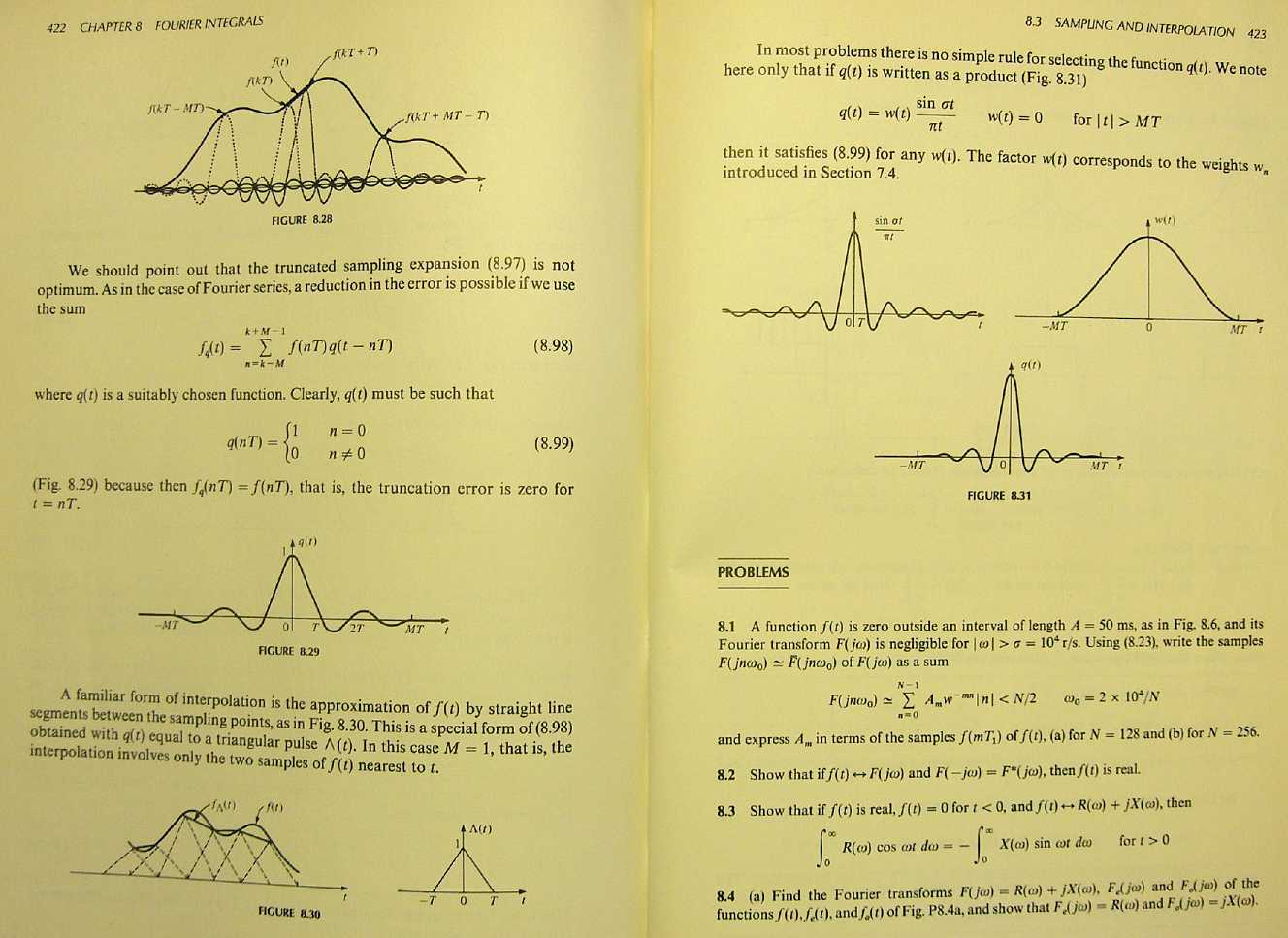
So before you believe half or so of all those complicated looking
(which is really not so true compared to long existing theoretical
physics) signal processing papers with far fetched mathematical proofs,
check out if sampling theory rules are obeyed, or you might be making
absolute error into infallable mathematics which proofs things which
for a reasonable electronicist would be clearly unprovable to begin
with....
Let's look at the definition of band limited in the above pages from
the same book:
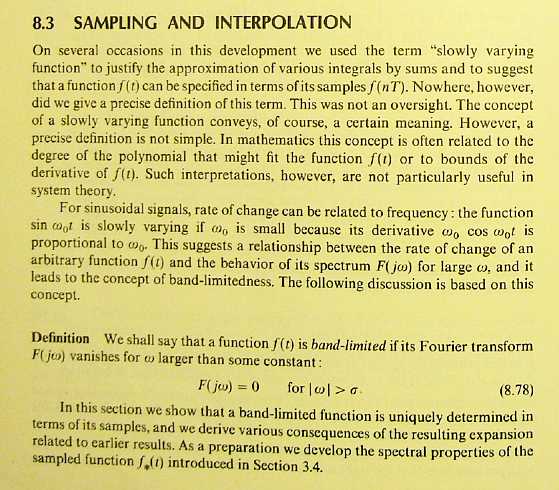
what are we learning? Well, the frequencies above sigma are supposed to
be zero, not Lim-->0 even, certainly not filtered over a n-th order
filter of some kind or with some points of the ohmega axis being zero,
it is required, to use sample theory according to mathematical
defination to BE ZERO. It is never exactly zero for any filtering
algorithm of any normally used kind. Never. So all proofs which require
sample theory would better be carefully looked at, because by far most
'proofs' are derivations with not even regard for this principle can
best be seen as approximating derivations without explicit definition
of the type and quanity and quality of the error term. Very
mathematically shady.
Sorry guys, frequency modulated sine signal already has infinite
spectrum, and therefore cannot be perfectly reconstructed as is needed
for many mathematical proofs in fourier theory sense because it can be
proven to always violate the Niquist criterion per definition and
therefore only aproximating mathematics are possible, no proofs.
And also it would be good for 'guys' who want to get into the obviously
popular mobile communicaton business to get at least a first lesson in
high frequency electronics, to understand the basics of lets say a
pre-second world war super heteredyne receiver circuit and before they
start filtering antenna signal in the digital domain wonder where they
are going to buy a 32 bit 1GigaHerz well-sampling Analog to Digital
converter ?!?!
Those signals, guys, are not processed electronically that way. They
are first processed through certain important and very involved
electronical signal processing, and then when you are up to dat in the
medium frequency part ot the receiver, made into special property
digital signals, maybe.
So all those 1GHz digital signals, they mostly don't really exist in
mobile phones, so who cares about digital signal procesing algorthims
which work on supposed digitized signals which don't even exist?! Have
a look at a high frequency Analog to Digital convert chaps, and shiver.
When you are up to that, most of those signal processing algorithms
which appear to be so appealing are peanuts compared to the advanced
electronics designs in fast and accurate AD converters, really, belief
me: nobody needs that crap much in that 'real' electronics world.
Most things in europe in that field too, just like in computers is more
about who gets patents on ripped off and stolen ideas, which probably
were already freely available in the USA a decade before then doing any
innovative work themselves or any invention at all or anything that
anybody really cares about. Sorry to say, but that is just too true.
Homework ?
Well, when I was 12 or so it was, about similar subject, the
constuction of a mixer:
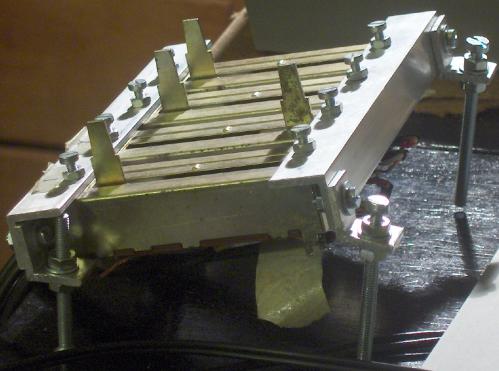
And this works ? Oh yes, its in normal use already a long time, it has
no active electronics to distort the signal, though it attenuates the
sources, but it works fine. I did the subframe to have no screwholes on
the frontpanel (as I also did with a wooden enclosure when I was
little) and to be able to take the machine apart easily.
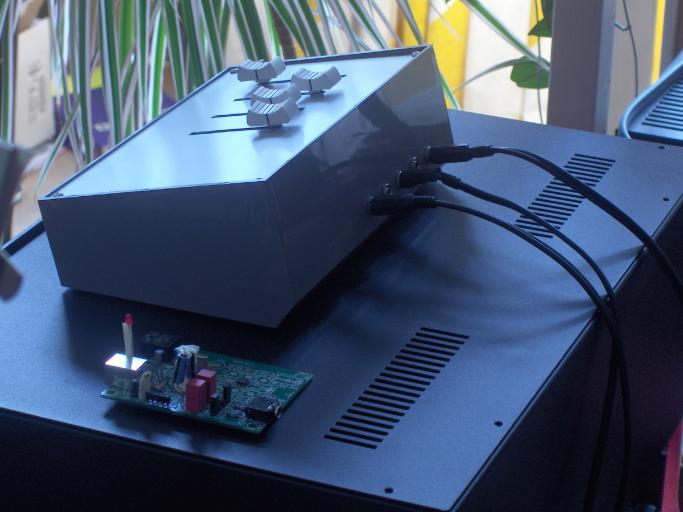
Books in the language library
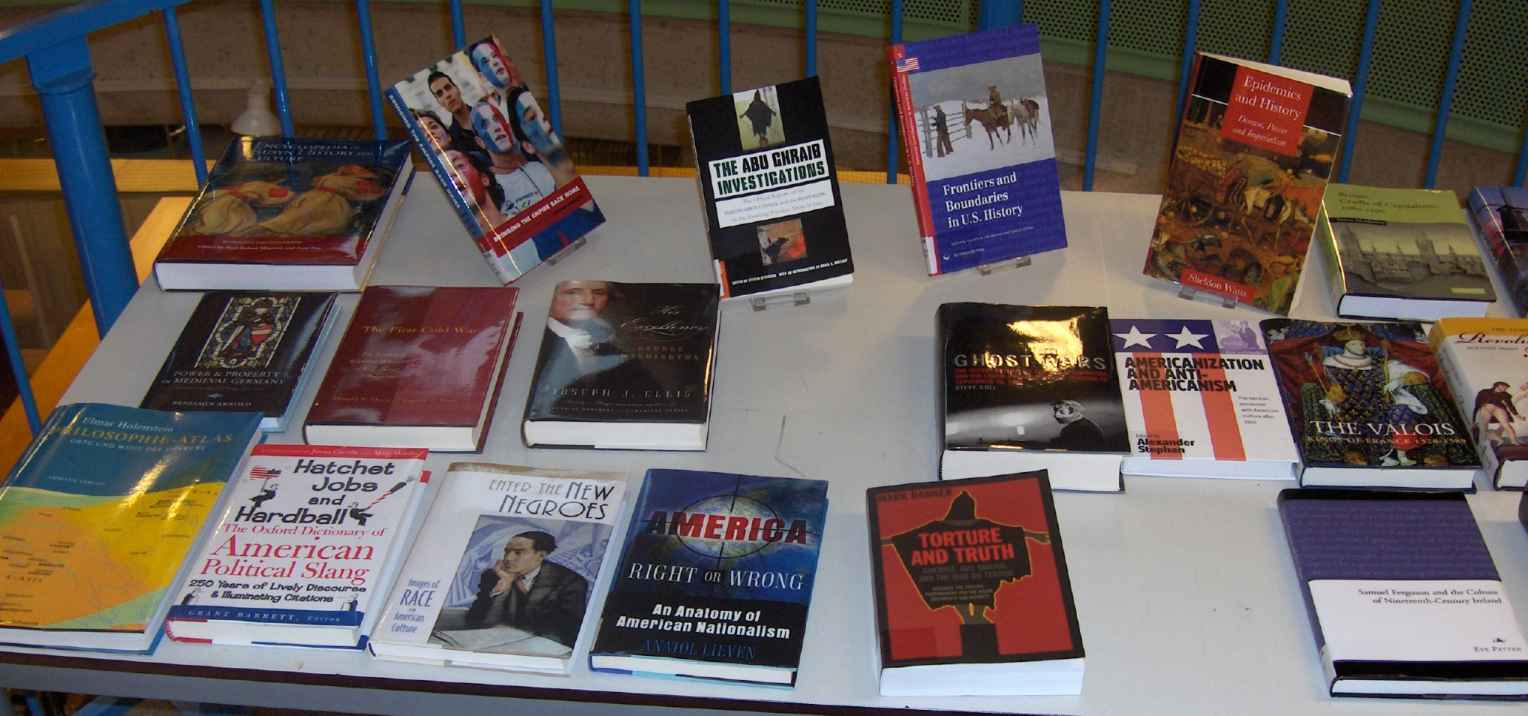
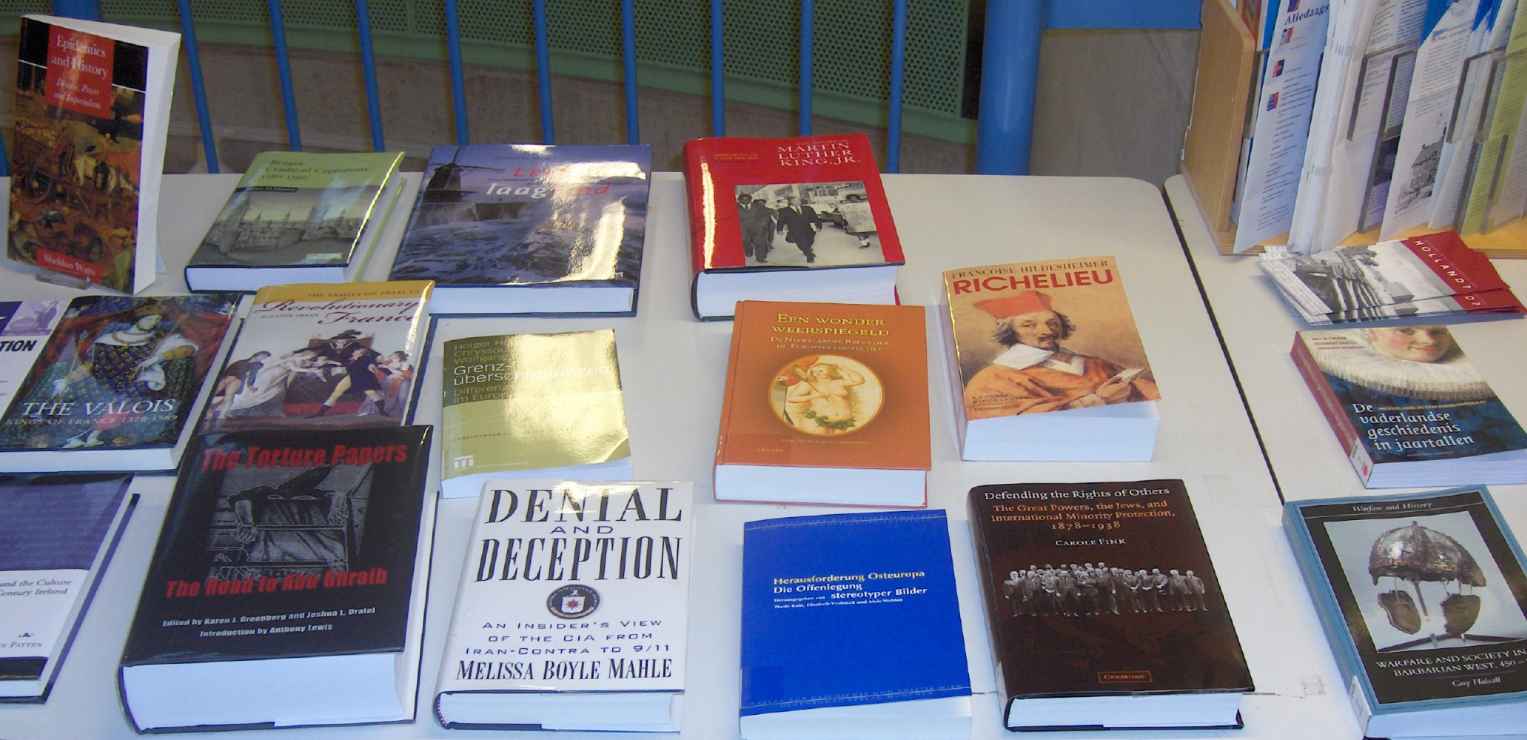

A Amsterdam park
Probably the only nice picture than can be taken in the whole park, on
a not so warm spring day, but anyhow, this looks good as a 1600x1200
screensaver, but I guess you browsing people wouldn't appreciate that
here...

Dispensational Truth
That's a christian term meaning how the plans of god are supposed to be
covering the ages of human history in distinct biblical periods with
their own name and rules according to which God deals with mankind, if
you want to belief that.
Rightly dividing the various clear timespans sure makes the bible a
whole lot more transparent and clear to oversee. The main
dispensational divide is the one between the old and the new testament
around before and after the historical existence of Jesus. The last
time or dispensation defore the new testament on the historic time line
was the time of the law or the prophets, depending on what scale one
looks, and after Jesus had arisen from the dead, according to the four
gospels, the 'time of the gentiles' started, or or the Dispensation of
Grace.
I long ago had a book from Clarence Larking, from the time I used to
requent a bible school for a number of years, recommended literature
from Dr. Albert Grimes, who wrote a profound course on most christian
subjects (for which he received a honorary doctorate in the US I
think), in line with lets say the charismatic and serious christian
teachings from the 60's and 70's and the name of that book was
dispensationa truth. It was a big book, probably about the size of an
LP record, and it had big plates in their of this kind:

I got these from the internet, I frankly don't know if there is (still)
copyright on them, I downloaded a lot of them, though not all I jused
to have in the book I think. As a picture on a web page they are a bit
big to keep them legible which looks nice if you have a high resoltion
monitor. I view on a 1600x1200 19"(cheap !) monitor, which makes these
plates looks just fine, but the average browser will have to scroll a
little I guess, even though I made the next image a bit smaller:
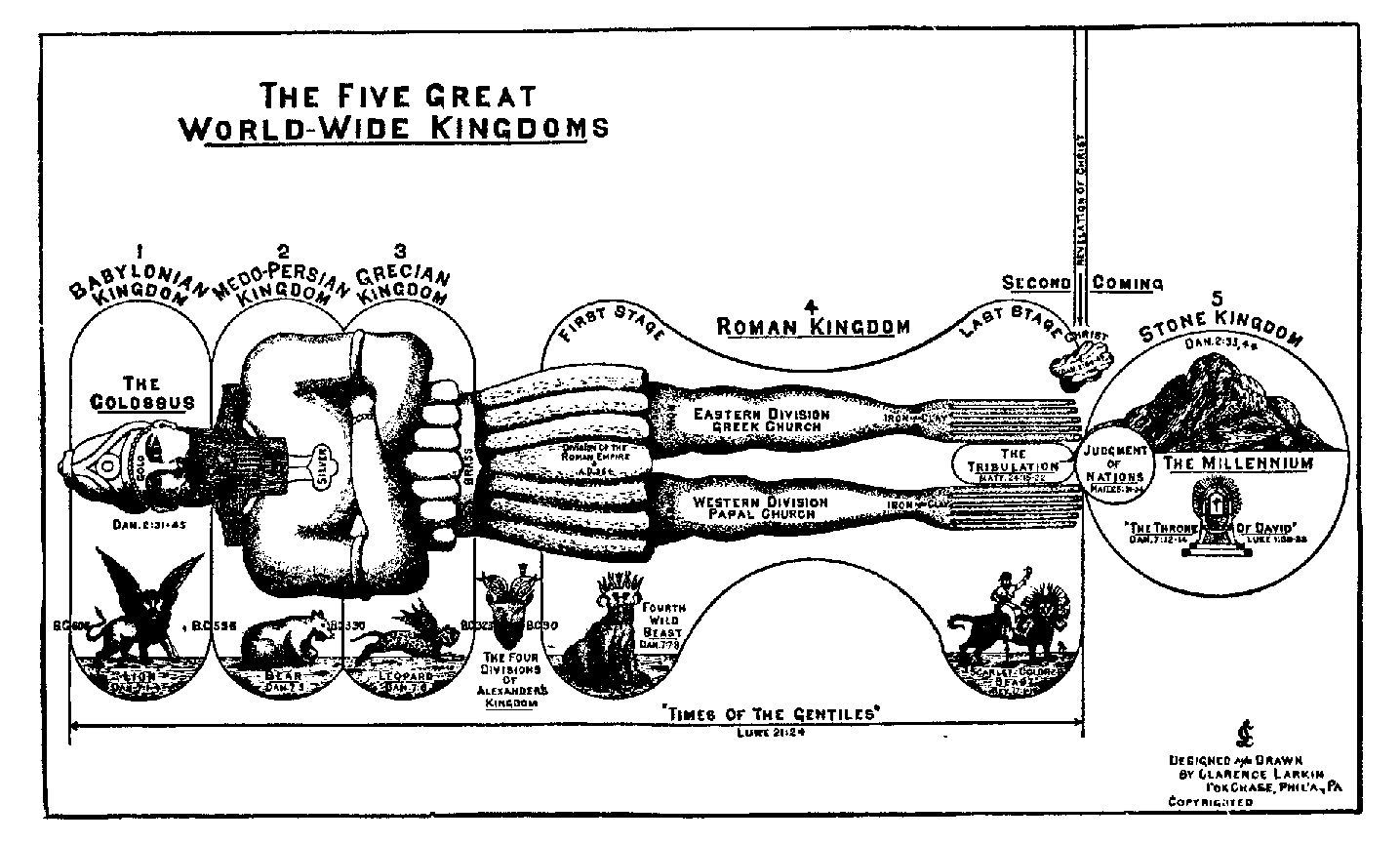
For these diary pages it is probably a bit far stretching to explain
all the details of these image, though these subjects are profound
enough and certainly worth teaching/learning. Look up the scriptural
references to get an idea of the meaning, and the origins of the images
if you like.
Controlling the computer world
When Kraftwerk wrote their famous song ''computer world" from before
the high day of the personal computer, I'm sure they didn't have the
dutch dreadfullness in mind.
I recently found this official gouvenrment web site http://www.ictregie.nl which means
Information and Communications Technology directing, which I'm sure is
inspired by my being into 'scripting' language Tcl/Tk, which is still
open and interfaces with most things on software earth, and not
completely messed up by the IT boys with tie and contacts with the dark
side of life on earth, and which was chosen by me at some point of my
computer graphics project for rapid interface prototyping and was
another good contribution which had to be had by the bad guys and put
down, I'm sure, which didn't work.
Theres only one word which comes to mind reading this TOC of the main
report on the work of this official dutch gouvernment 'organ' about
holland 'knowledgeland': fascism. Here's the TOC:
14-5-2002
02
ICT 000
2
Inhoudsopgave
1.
WRR-RAPPORT AAN DE REGERING, VAN OUDE EN NIEUWE KENNIS.............. 4
2.
DE PIJLERS ONDER DE
KENNISECONOMIE..............................................................
5
3.
MULTIMEDIA: HET GEZICHT VAN DE
TOEKOMST................................................ 6
Opdracht..............................................................................................................................
6
Visie.....................................................................................................................................
6
Aanbevelingen
.......................................................................................................................
6
4.
VOORBEREIDING ICT-AGENDA 2002 EN
VERDER................................................... 7
4.1.
BOUWSTENENNOTITIE
BREEDBAND:....................................................................
7
4.2.
BOUWSTENENNOTITIE ICT IN HET
ONDERWIJS................................................ 7
4.3.
BOUWSTENENNOTITIE ‘ELEKTRONISCHE
OVERHEID’..................................... 8
4.4.
BOUWSTENENNOTITIE ICT-ONDERZOEK EN
INNOVATIE............................... 8
5.
VOORTGANGSRAPPORTAGE WETENSCHAPSBELEID
2002................................... 9
6.
NEDERLAND LOGISTIEK NETWERKLAND, MOGELIJKHEDEN VOOR ICTTOEPASSINGEN
IN
TRANSPORT & DISTRIBUTIE IN
2006........................................... 10
7.
UNIVERSITAIRE ICT-KENNIS IN NEDERLAND, VAN CONTACTEN NAAR
CONTRACTEN......................................................................................................................
11
8.
NATIONALE ONDERZOEKSAGENDA INFORMATICA 2001-2005 (NOAG-I)....... 12
9.
VRIJBAND: EEN BREEDBANDVISIE VOOR
NEDERLAND..................................... 13
10.
SAMEN, STRATEGISCHER EN
STERKER...............................................................
14
11.
VERLANGEN NAAR DE EINDELOZE
ZEE.............................................................. 15
12.
TECHNOLOGY ROADMAP ON SOFTWARE INTENSIVE SYSTEMS................. 16
13.
MEDEA+.......................................................................................................................
17
14.
RAPPORTEN IN HET KADER VAN DE NOTA DIGITALE DELTA.....................
18
14.1.
DE DIGITALE DELTA, NEDERLAND
ONLINE.................................................. 18
14.2.
DE DIGITALE DELTA, E-EUROPE
VOORBIJ...................................................... 19
14.3.
INTERNATIONALE ICT-TOETS
2000...................................................................
19
14.4.
INTERNATIONALE ICT-TOETS 2000, VIER SECTOR
STUDIES...................... 20
14-5-2002
02
ICT 000
3
15.
CONCURREREN MET ICT-COMPETENTIES, KENNIS EN INNOVATIE VOOR
DE
DIGITALE
DELTA...........................................................................................................
22
16.
ICT EN NEDERLAND, VAN TECHNOLOGIE TOT TOEPASSING ......................
23
Dreadfull, isn't it?
They think it's all great, but I think it is proposterous to think like
the expression "holland: guideland". It's a poststamp size country on
the world map, which only happens to have the biggest harbour in the
world because they are conveniently situated at the rhine to the german
industry area, which has shown no special capabilities for innovation
compared to the rest of europe, with maybe the exception of Philips
electronics, which are certainly not agreeing in general with that
fascist view of ruling everything in IT world and using that to rule
all people into hell, it seems.
It's as sick as this official gouvernment organisation promotes in
'normal' computer related life as well.
I've experienced this myself when I wanted to make some money there
(the only motivation for most people in the top of IT when it all
started when I was a student): nothing can be made to work humanly
normal, honorable and with normal respect for personal freedom. I've
tried applying for a normal (temporary) job in that world for more than
a little while, with as only affect that focus was forced to anything
that I wouldn't be trained or knowledgeable enough at (which is
ridiculous to try, and that therefore failed) and met only little short
of hostility to want to earn my living and some more in IT context, and
when I have worked in some short job agency job in IT I was treated so
outrageously condescending by some people (certainly not by all, and
mostly not by the more technical and knowledgeable people) and was put
away after already miserable circumstances that it defies description,
and can only be understood by (foreign) people which have studies the
actual nature of the dutch of the last decades. Later on I worked
(amoung other things) with computers in an (art) gallery, where also my
knowledge was abused, lagely unpaid, and I was cast aside and
completely unrespected, probably for similar reasons: their I(C)T ideas
must be found superiour then mine for them to rule the world.
That of course hasn't happened, I am sure they don't even cover the
basics of computer and software architecture or digital (signal)
processing for a bit, while thinking they are into theories about how
computers work that will make them the greatest big brother rulers of
all. Absolutely to laugh at for hard-core computer knowledgeable people.
It's like they belief all people will be subdued to coffee machines
because they know all the screws and bolts of certain types of coffee
machines, which at some point will have to be accepted by all people,
and so they can manipulate all people in the longer run by some
incredible association and fuse locker control game or something. Not a
chance, if you ask me, luckily. Maybe if the netherlands were germany
in '39 they could have made a lot of tanks and really try, but luckily
as it is: not a chance to win. But meanwhile it started two decades ago
t suck bad, and now it downright fascism. Really evilminded and
impossible to see as a democracy, as I witness weakly in the second
chamber proceedings. Not the european community at large, I was in
germany (Munich, Koeln, Dusseldorf and other places), france (paris,
mid-countryside, Les Vosges), switserland (which wasn't exactly fun),
luxembourg (shortly), belgium (Brussels, Gent), the last years, and
nowhere it was as bad and oppressive and un-free as in holland, for
certain: no comparison. Not that I 'love' Europe, if it was for me I'd
have emigrated to the US a decade and a half ago (as everybody that
knew me in that time knew), but the various western european coutries I
visited recently are not in the line holland at all.
I though I'd have a look at which people are in this forum/directing
agency (the kremlin of dutch software ?), oh boy oh boy oh boy. Don't
forget I know at least personally one of the lets say more well known
persons with renown at significant level in the field (probably
unfortunately and 'stolen', but anyhow), my graduation professor and
the one who invited me to work at the top (at that time still) of the
whole of Delft University of Technology (when I was in that section, it
was the highest and most esteemed, by far even). I know how these
dominican-like types work in the scene I studied/worked myself from
personal first hand intelligent experience, and you'll have to be some
piece of work bastard to go against this and win in normal life, of be
very good at what you do (like I was/am).
One of them is a war guy, going to a american defence conference, where
(after checking the public proceedings) he appears to be preaching a
perverted version of my struggle for decent interface definitions from
when I worked at Delft University, on a computer graphics project.
Another appears to be director of a large dutch software company and at
te same time (?) is a member of various economical organisations,
including the central economical council and a place in the american
research bureau Forrester Research. Some guy from a foundation for
'safe and reliable internet use' (?) in holland, policy secretary ICT
in the entrepeneurs union, a Philips director of research, a professor
in a (not so excellent) physics/mathematics institute, a university
professor econometrics/mathematics (2d technical uni of holland) , a
member of the board of university coorperation union and board
member of university eindhoven former CEO of IBM holland. A board
member of the dutch statistical institute, 'renewer' of dutch social
insurance system for employees, director general of the tax
department. Director of exact sciences of the organisation for dutch
scientific research. A former director of the centre of mathematics and
informatics in amsterdam, currently director of the new TNO (foundation
for natural sciences research) division telecom (new after takeover
from dutch telcom organisation, which stopped innovating before I spent
some time there long ago already). A person from IBM netherlands and
the council board of foundation for technical sciences (which I've been
supported by in the past). A mathematics master education
coordinator at free university amsterdam (low rated), and Shell. An
economics professor in the south. A professor in a remote centre for
telematics and IT in the area of distributed information systems (with
very vague sounding publications).
The Dead Parrot Sketch
Monty Python
The Pet Shoppe
A customer enters a pet shop.
Customer: 'Ello, I wish to register a complaint.
(The owner does not respond.)
C: 'Ello, Miss?
Owner: What do you mean "miss"?
C: I'm sorry, I have a cold. I wish to make a complaint!
O: We're closin' for lunch.
C: Never mind that, my lad. I wish to complain about this parrot
what I purchased not half an hour ago from this very boutique.
O: Oh yes, the, uh, the Norwegian Blue...What's,uh...What's wrong
with it?
C: I'll tell you what's wrong with it, my lad. 'E's dead, that's
what's wrong with it!
O: No, no, 'e's uh,...he's resting.
C: Look, matey, I know a dead parrot when I see one, and I'm looking
at one right now.
O: No no he's not dead, he's, he's restin'! Remarkable bird, the
Norwegian Blue, idn'it, ay? Beautiful plumage!
C: The plumage don't enter into it. It's stone dead.
O: Nononono, no, no! 'E's resting!
C: All right then, if he's restin', I'll wake him up!
(shouting at the cage)
'Ello, Mister Polly Parrot! I've got a lovely fresh cuttle fish for
you if you show...(owner hits the cage)
O: There, he moved!
C: No, he didn't, that was you hitting the cage!
O: I never!!
C: Yes, you did!
O: I never, never did anything...
C: (yelling and hitting the cage repeatedly) 'ELLO POLLY!!!!!
Testing! Testing! Testing! Testing! This is your nine o'clock alarm
call!
(Takes parrot out of the cage and thumps its head on the counter.
Throws it up in the air and watches it plummet to the floor.)
C: Now that's what I call a dead parrot.
O: No, no.....No, 'e's stunned!
C: STUNNED?!?
Or maybe :
 "Hilter in England", Monty Python
"Hilter in England", Monty Python
Well. A jesuit conspiracy to takeover the IT world, to begin with in
the netherlands? A buffer to make me rejected from a well paid
respectable jobin the area I could manage with both hands tied behind
my back and blindfolded? Nice boys who must be left to their 2d rate
worldly game? Unserious amatures who mean no harm? A ultra right secret
assasination commitee?
Normal dutch mores? You judge.
John Sandford: the Prey series
That's an important contemporary writer, with a website by his son it seems who
writes a few different thriller series (mostly), of which the biggest
is the Prey series, which is mostly about a police inpector (or
something like that) in Mineapolis solving murders of all kinds.
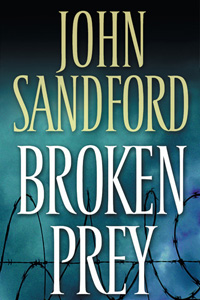
Very good to read, and in spite of the genre (like Sherlock Holmes)
most definately literature. I read all prey series novels thus far I
think, and 10th of may a new one comes out, you can read first chapters
for free on the website.
The biggest Musical Intrument Fair in Europe
Which in german is called 'musikmesse' in frankfurt, where there is
indeed a very large complex of fair buildings, about 5 times bigger
than the biggest in holland, I'd think, but I wasn't paying attention
to that.
I was able to go there (alone) by car, which worked fine, though one
has to go from the parking places to the fair by bus, which isn't
optimal for people like me, but ok, then you have probably all musical
insturment manufacturers of any type of instrument together with a
stand and demonstrantion products, flyers, etc.
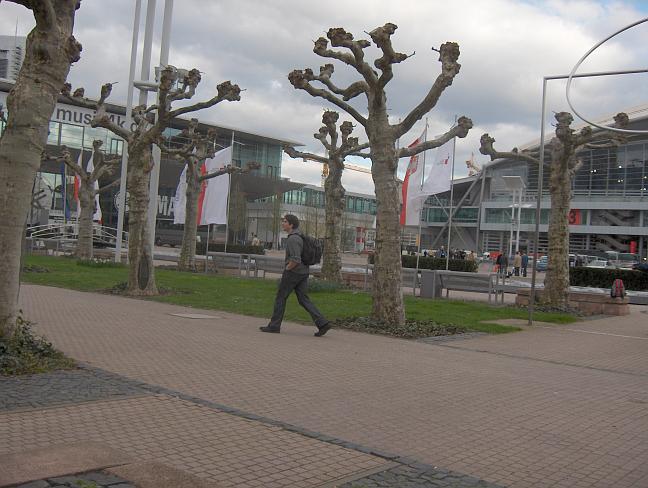
Note that I was there as visitor, not as exhibitor, which with the
latest synth and software might have
been possible.
I looked at most electronic instruments and other equipment stands and
of course software and pianos and such. I had a good time at the
(major) Yamaha exhibition playing guitars and organs and some good
grand pianos, and big drums, that was cool enough.
Also I talked a bit and looked around and at their shows of Native
Instruments, from Germany.
So what does Theo Verelst do with normal modern consumer computers ?
Well, what I have been able to use lately are mainly two consumer
machines, of which one a fairly cheap notebook from a supermarket (hi
hi), which is quite a computer beast though: good screen and graphics
card (Nvidia Gforce FX 4200 I think) , 512 Megabyte main memory, 2.6
GHz pentium, most interfaces including firewire for digital video, and
wireless network (which I have no driver for on linux though), which
runs XP (currently SPII), or RedHat Linux 9.0 (chosable at bootup),
both with a lot of programs installed, this is an example windows
program menu:
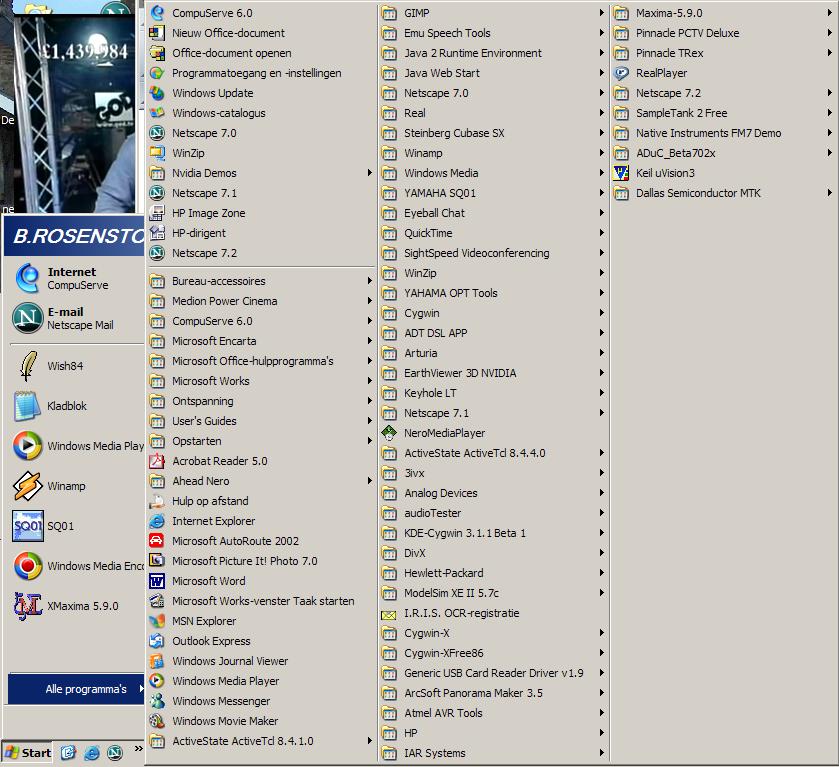
Lets see there is wish, which is tcl/tk, media player, in use for
anything from the web (video/audio/presentation) and video links over
the other computer, winamp for playing CD's (with equalizer) Radio
Caroline and some mpeg video SQ01 is the Yamaha audio and midi
sequencer which comes with their products which allows good multitrack
recordings,
Nero is CD burner of course and also an audio waveform
editor with effects (like compression),
Movie maker I've used
extensively with a digital camera to make fairly high quality video
cuts, gimp is a good drawing and image processing program of which I've
the gimp2 version running on Linux and the other machine, which is
already comparable with Photoshop (not quite the same, but certainly
useable), and on linux I have combined my BWise blockwise graphical
programming program with Gimp2 for powerfull automated image
processing,
Netscape is the only internet browser and page composer I
use (I never use internet
explorer, because it probably would give me virusses and problems
within minutes of use... while netscape has served me well since the
first (mozilla) browser which existed on workstations with no virusses
for a long time already, which is especially important on the 24/7
internet connected machine, which has also remained virus free even
without scanner and such by switching all unneccessary services off and
NEVER using IE...) ,
realplayer is probably the best media player and
compressed format (the person paying for the internet connection is
also member of for isntance WBGO jazz radio from New York which sounds
more than fine enough with realplayer at 44kilobits/sec) below shown
with the (free , 150kps) Nasa TV internet channel with live
International Space Station video,
Steinberg Cubase SX comes from the
free software package with a (very) cheap midi keyboard, and acts as a
good midi sequencer, media encoder is shown below with a live audio
signal being encoded for transfer over a local network, and also I use
media encoder to live (!) encode television or video at 3megabps to
view on the other machine, quicktime and winzip are clear, cygwin is a
extensive unix emulation for windows, including even open source
XWindows for use on windows, as seen below with a local and a remote
XTERM, which mixes fine with windows programs, and cygwin has a good
(GCC) compiler and tools, too.
Adsl is to connect up a standard USB
ADSL modem up easily, so when one machine fails, unplugging the usb
plug and plugging it into the other machine gets the 24/7 webserver
running again in minutes, even during powerfailure (currently the modem
does about 750 kilobits/sec upload and about 2 megabits/sec download,
which is cool).
Arturia is a software synthesizer, 3iv is a mpeg4 en/de
coder (the encoder expired I'm sure, I used it to compress a conference
video for a swedish 'customer'..., well 10 euros only), Analog Devices
contains a extensive DSP programming environment for the Blackfin DSP,
the audiotester is shareware which expired, I made my own signal
generator in its place already, and will do a spectrum analyser too I
guess, KDE is a complete KDE implementation on cygwin, running under
windows, Hewlett Packard is scanner software and digital camera
software, Modelsim is demo (I didn't like it), IRIS is OCR which works
well in fact, Atmel is a microcontroller programmer I didn't use,
Maxima is a strong open source mathematics package like mathematica
(but existed earlier), Pinnacle TV is a fairly good USB connected TV
digitizer box for normal TV and video signals, which does a REALTIME
mpeg (1 or 2) Video encoding, also on a notebook, so I could for
instance use it to watch and record satellite TV in a car setup (with a
voltage convertor).
Sampletank and FM7 are (interesting) software
synthesizers (all demo versions which work). The last item is a
microcontroller programmer I didn't use yet, the second and third but
last are programmers and compiler and IDE for the Analog Devices 7020
ARM 16/32 bits 1 MegaSample/second AD and DA converter fast
'micro'controller which I have a very small size sample board from,
which can be perfectly fash programmed (in-circuit, over a serial
adapter cable) with the keil ide running (free) gnucc for Arm, as I
described on a previous
diary page.
These menus don't show all the cygwin progams and projects of my own,
because they aren't started by windows menus, and some other programs
like a CD ripper and mp3 encoder aren't shown, as well as the mplayer
media player which (when preferably run from linux) is probably the
highest quality video player, and Open Source!
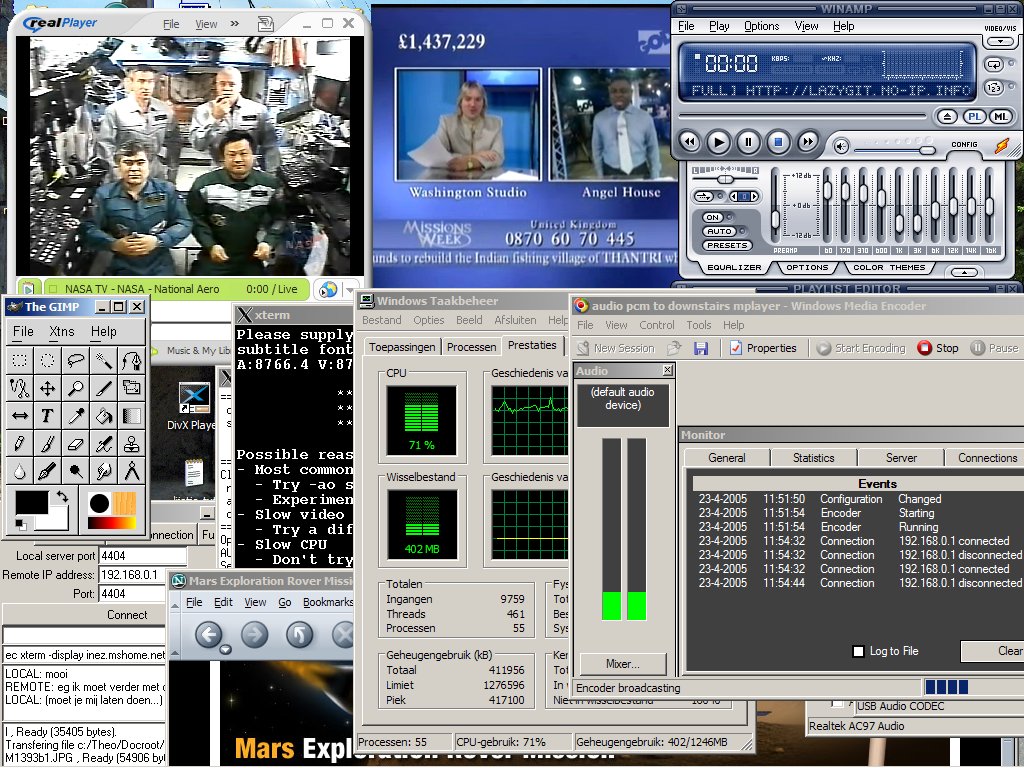
A screen dump from a number of simulataneously used programs (viva
multitasking, but preferably on linux...) showing from upper left to
lower right: RealOne player showing live Nasa TV, mplayer showing a
satellite channel being encoded life from a (extremely cheap but fine)
portable digital satelite receiver through media encoder, and
transfered over a 100baseT 30 meter local network to this machine,
winamp trying to play Radio Caroline (nice 70's music) but getting
server full, the gimp (to do this screen dump for instance) a local and
a remote (networked, using cygwin on the remote machine) X window, the
task control window showing 71% CPU use and not too much (but no
little) memory, media encoder encoding a high quality stereo microphone
signal from the high quality USB audio card I made for transfer over
the local net for listening on the amplifier setup connected to the
other network machine, pcom showing realtime messaging, file tranfer
and remote command execution over the network (or when needed internet)
and a netscape browser window showing Mars Rover progress. In the right
lower corner, audio volume sliders for the builtin AC'97 soundcard and
the (hot-pluggable) high quality USB audio AD/DA converter.
So what is the PC setup then? Well that depends on what there is, but
I'm using regularly the following 'tricks' to have a bit of fun or work
(for instance conference covering, (audio) studio related work, DJ
stuff even at times, and of course sound synthesis and such and
sometimes I did some computer graphics stuff. Fun is of course as I
described:
<>satellite dish --> digital receiver --> video/audio signal --> TV card / usb audio card in/on PC
<>--> software video/audio encoder (media encoder) --> 100baseT ethernet (30 meter)
--> other PC: mplayer or media player to view the signal
Alternatively, one can use the decent pinnacle TV box to record a tv
channel on harddisc, which can then be read over ethernet by another
machine and fed to mplayer in real good quality (up to 6 or even 12
megabits/sec, which is close to an average quality DVD):
Cable TV signal or video recorder signal or camera signal --> pinnacle TV digitizer box
--> USB connector to PC or notebook --> realtime harddisc recording program for mpegI/II video
--> a tcl script to read the file immedeately (with any delay) and send it over the network
--> it's companion Tcl program on the other machine on the network copying the video signal to 'stdout'
--> mplayer reading the video data from stdin with the - option, running as the second program in a cygwin pipe
That gives real good networked video, at 6Mb/s and D1 quality (720x576
pixels, 30fps) on a good screen its almost as if it mostly better then
an ordinary TV, though unfortunately I think some of the media players
isn't up to the complete 30fps speed in all cases of the encoded
signal, so that one can see slight variations in for instance the speed
of the 'running text' on the bottom of CNN news, and also certain
camera motions work perfect, and then the mpegII motion estimation
seems to make the image sampling better on a fast refresh screen, but
some fast camera motions work without hesitation but not perfectly like
in a cinema.
The described setup and encoder appear to be relatively free from all
the encoding en enhancement sh*t so often seen in all kinds of hardware
and software setups. mplayer is fairly cool (especially on Linux, which
works for the above setup) and straight, en when necessary mpeg1 can be
chosen at 1mbps for the pinnacle real time encoder to get only a
sequence of motion effect free jpeg images in the video stream, which
is a good comparison, but of course lacks the more refined D1 6Mb/s
mpegII view. Room for improvement, but really, the bright and fast
enough notebook screen with mplayer on full screen doing the D1 mpegII
signal is neater and cooler than any normal TV. If only all the
motions would be *completely* right.
Sigh. Try some digital camera (I've used a fairly good sony consumer
camera reasonable extensively for times), and use ANY connection
(firewire/analog/even USB) and ANY encoder/recoder (like windows
moviemaker or encoder or the above piccacle box, or tmpEnc or whatever
of the known software packages) and try to get a cool cinematographic
D1 quality film motion of some cool kind. Grrr..
But on the other hand fairly amazing qualities are possible with normal
consumer equipment.
So what can these PC's do? Well an example connection diagram:
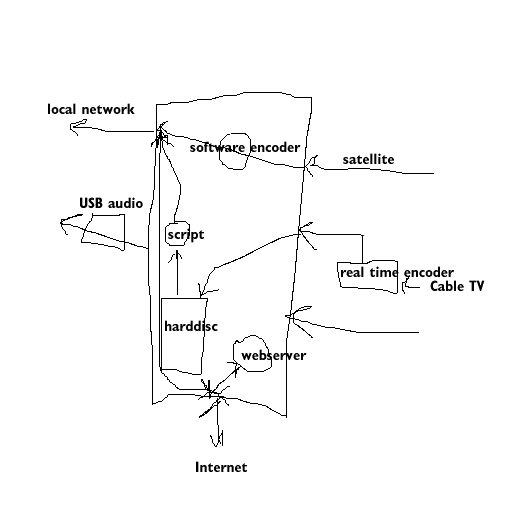
All this can work simultaneously, so webserving, web connection to
local net, audio reproduction / AD conversion, and transfering /
recording 2 video signals. But then CPU time is critical.






 "Hilter in England", Monty Python
"Hilter in England", Monty Python


